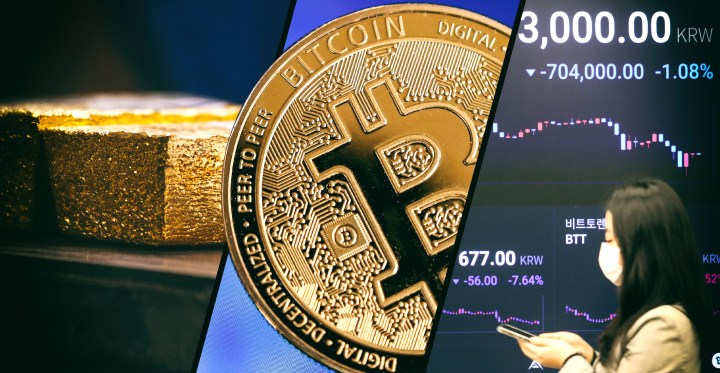BUSINESS REFLECTION
After the Bell: Mysteries of the gold price and the halving of bitcoin

Over the years as a financial journalist, one phenomenon I have discovered is that often, when I try to explain price movements in securities to readers, the truth is I’m usually trying to convince myself in the hope that if I can do that, I’ll be able to convince everyone else.
Price movements in securities often have varying and complex underlying forces; some trends are more explicable than others, and some are more apparent.
So, to explain the price movements, you cite forces that might be a partial explanation, but since that may be insufficient, you feel you should overemphasise, often inadvertently, those forces you can identify. So please, bear all of this in mind.
The worst, I have found, is the gold price, closely followed by the bitcoin price.
Both the gold price and the bitcoin price have simply exploded over the past few weeks. At the turn of the year, the gold price was just above $2,000/oz until the beginning of March. It’s now threatening $2,200/oz.
That would not be so remarkable were it not for the fact that even at $2,000, it was thought to be near the top; gold has never come close to these levels in history.
The rand price of gold is on the verge of being a joke: it’s now comfortably over R40,000/oz. All those old gold mines are suddenly looking like great assets again.
Bitcoin’s trajectory has been a little different but no less impressive.
The big increase happened in the last week of February, rising further in a very gold-like fashion. So the question, or at least one of the questions, is whether the same forces are pushing both of these notionally alternative currencies.
Well, if you were sitting on a panel or answering a question on a live television show, you might reach for the obvious: geopolitical risk, adding that gold jumped 5% after Hamas attacked Israel. But if that were the case, how would you explain that it’s 20% higher than that now?
Geopolitics is indeed prompting central banks to hold more of their gold, which is changing the demand/supply equation.
The Wall Street Journal quotes a precious metals analyst at Standard Chartered, Suki Cooper, saying that bullion hoarding by central banks has approached 30% of global mining production over the past two years. Last year, those institutions snapped up more than four times the amount of gold that was ditched by exchange-traded fund (ETF) investors in the US.
The general rule when it comes to the gold price is that gold likes bad news. In market terms, that equates to the rule that the enemy of the gold price is a rise in real interest rates. This has been true so often, that it’s taken as gospel – except that this time, it never happened. The opposite is true; real interest rates are coming down and the stock market is riding high – but the gold price is rising.
Well, then, there has to be something else, right? What about ETFs buying more gold? Turns out this is not the case – at least in the US, where ETFs have been selling gold aggressively.
And funny you should mention ETFs because they are, of course, the live television interview explanation for bitcoin’s rise. Despite some hostility by the US financial authorities, ETFs are now allowed to hold bitcoin.
ETFs are a convenient way for ordinary investors to get exposure to the price movements of bitcoin out of their regular brokerage accounts.
The problem with this explanation is timing. The entire market knew for at least a year that the SEC would grant this permission. As a result, some financial institutions bought bitcoin to be able to offer it to their clients when it became available via ETFs. But all that happened last year and the result was a general – but steady – increase in the bitcoin price.
What explains its skyrocketing over the past two weeks?
Some of it is clearly ETF buying; while big investment houses did buy bitcoin last year, I suspect they didn’t buy enough and there is more demand from their clients than they anticipated. That, of course, feeds on itself.
Other exchanges are now following the lead of the US. The London Stock Exchange has announced that it will be accepting what it calls exchange-traded notes from the second quarter of 2024.
This year, not only have we seen the approval of bitcoin ETFs, but bitcoin has scheduled a halving event for next month. For bitcoin, the “halving” happens every four years and it means that bitcoin miners get rewarded half of what they got before, which tends to push up the value.
The halving will happen on 20 April and it will reduce miner rewards from 6.25 to 3.125 bitcoin. Yet, once again, it’s not as though this halving event has not been anticipated.
There is one other thing: Daily Maverick’s CEO Styli Charalambous pointed out to me that the latest surveys of bitcoin ownership show an odd, new (and important) entrant into the market: governments.
The US government now owns around 215,000 bitcoins and the Chinese government a little under 200,000. That makes them among the largest owners of bitcoins. The UK and Germany are also up there.
This big jump in government bitcoin ownership only happened at the start of the year. Back then, governments owned 90,000 bitcoins, but now they collectively own about 566,000 – that is quite a bounce.
But it doesn’t seem as though most governments are taking a position.
The US government, we know for sure, and other governments, we presume, have accumulated their stakes through seizures as a result of fraud. Although they are the holders, they are not really the owners – the coins are often being held pending court action on behalf of the people who have been defrauded. That process will take time.
But it does change the nature of the bitcoin market, making it comparable to our old friend, gold. And some governments actually are investing in bitcoin, notably El Salvador, which became the first country to use bitcoin as its official currency. As part of that process, the El Salvadoran government bought around $105-million in bitcoin in 2021. Despite being derided at the time in some quarters for the decision, that stake is now worth around $170-million – quite a chunk of change for a smallish country.
But in general terms, the fact that most central governments now hold crypto is less of an endorsement than a general indication that the market is considered more legitimate than before.
Obviously, the dynamics pushing up the price of these two asset classes will change.
And equally obviously, people being interviewed on live television will have explanations for why they are going down. And I can tell you now, they will sound confident and logical.
And they will largely be faking it. DM



















 Become an Insider
Become an Insider
While I like Blockchain and its myriad uses for digital proof of ownership, securing transactions, etc., I have never and likely wouldn’t touch cryptocurrencies. I can’t remember which economist said it, but it was perfectly summarised as “if someone has to CONVINCE you it is money or currency, then it is neither.”
Digital central bank currencies are another animal entirely but I haven’t looked very much at it yet.
The fact that the USA and China have over 200,000 BTC each is hysterical. Paints QE in an entirely new light. At least with the QE, they acknowledged they were printing money. With BTC, the literal ‘Emperor’s New Clothes’ of the finance world, it seems that even those in charge of public money will spend it on nothing. Hats off to the BTC ‘inventor’, you’ve turned nothing into a perceived something that will never be anything other than nothing. Genius.